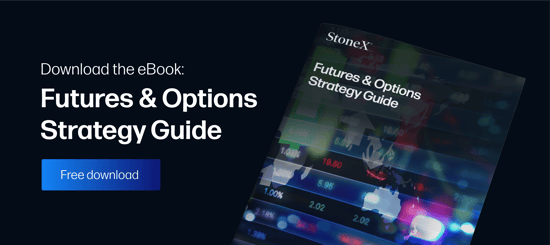Alongside the Standard & Poor’s 500 (S&P 500) and NASDAQ Composite (NASDAQ) equities indices, the Dow Jones Industrial Average (DJIA, DOW) is a leading barometer of U.S. economic performance. Subsequently, DJIA futures charts are some of the most widely referenced market technicals in the world.
However, depending upon your resources, goals, and location, your ideal DJIA derivative product will vary. Let’s take a look at three of the most popular: the E-mini DOW, Micro E-mini DOW, and DOW 30.
What Is the DJIA?
Before delving into the key DJIA futures charts, let’s discuss what the Dow Jones Industrial Average actually is. The DJIA is a price-weighted stock market index based on the values of the largest 30 companies listed on U.S. exchanges. It includes Microsoft (MSFT), Walmart (WMT), Intel (INTC), Johnson & Johnson (JNJ), and other household names.
First launched in 1896, the DJIA was created by Wall Street Journal editor Charles Dow and numbers guru Edward Jones. Meant to be an all-in-one representation of U.S. financial strength, the index is calculated by adding the stock prices of the 30 largest publicly traded companies before dividing by the DOW Divisor.
Originally, the DOW Divisor was 30, but over time the value has been adjusted downward to account for dividends and stock splits. As of September 2020, the figure sat at approximately 0.14579.
This is a key part of deriving the DJIA because the aggregate stock price of the 30 constituents is divided by the DOW Divisor. For instance, if total prices stood at $4,500, the DJIA would be represented as 30,866.31 ($4,500 / 0.14579).
Any trades are educational examples only. They do not include commissions and fees.
E-mini and Micro E-mini DOW Futures
When it comes to trading DJIA-based futures, you should have three prominent contracts on your radar. The first two are E-mini and Micro E-mini DOW futures. Listed on the Chicago Mercantile Exchange (CME), these contracts offer traders around the world an easy, affordable way of engaging DJIA derivatives. Here’s a quick look at the contract specifications:
Here are the contract specifications for each CME corn product:
| Contract | Symbol | Tick Value | Intraday/Overnight Margin |
|---|---|---|---|
| E-mini DOW | YM | $5.00 | $750/$9,000 |
| Micro E-mini DOW | MYM | $0.50 | $100/$900 |
Both of the contracts listed above track the DJIA―as the index moves up and down, their values change accordingly. However, the E-mini DOW and Micro E-mini DOW are leveraged at $5.00 and $0.50 per tick, respectively. This functionality enables active traders to customize exposure and to take either long or short positions in the market.
Perhaps the best thing about E-mini and Micro E-mini DOW futures is that they’re user-friendly. To trade, simply reference the correct symbol, contract month, and year. After that, input the data into your software trading platform to open DJIA futures charts or order entry DOMs.
DJIA Contract for Difference (CFD) Products
For international traders, contract for difference (CFD) products offer a way of trading various assets without having to assume ownership. A CFD is a contract between two parties that obligates the buyer to pay the seller any difference between the contract’s current value and its value at expiry.
One of the most popular CFD products facing the DJIA is the DOW 30. Offered by brokers around the world, DOW 30 CFDs are similar to standard DOW futures. However, CFDs exist as a contract between a broker and a client, making them over-the-counter products rather than exchange-traded assets.
Accordingly, this functionality brings into play various counterparty and pricing risks. As of this writing, CFD trading is not permitted in the United States. If you’re eligible to trade CFDs, then opening the related DJIA futures chart is easy. Simply go to your broker-provided trading software, find the DOW 30 symbol, click, and open.
Getting Started with DJIA Futures Charts
To learn more about how you can trade the DJIA via futures or CFDs, a conversation with a reputable broker is a great place to start. Get up and running via a free one-on-one consultation with a StoneX market professional today!



